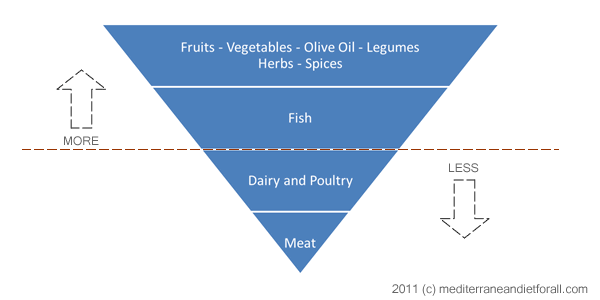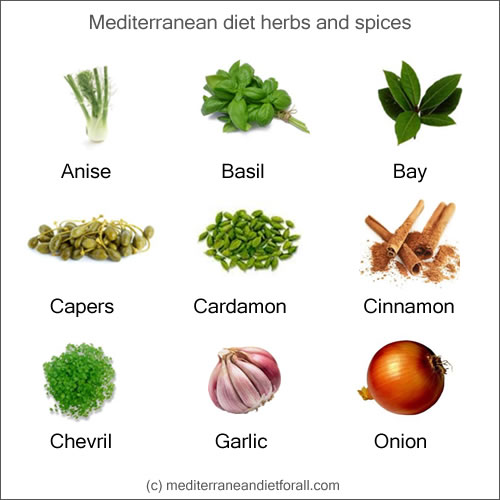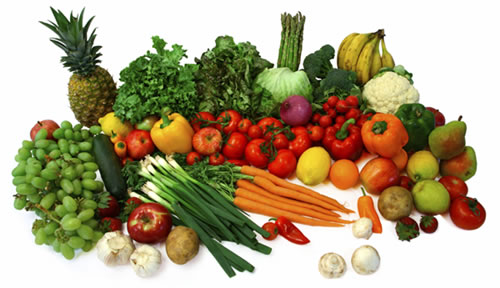All over the world the Mediterranean diet is renowned for its capability to lessen the incidence of various diseases especially those which involves cardiovascular problems. Most studies show that due to the highly health-conscious theme of the Mediterranean diet food pyramid, it is the most recommended diet plan among people who want to shift their unhealthy eating habits into a healthier one.

Many institutions present the Mediterranean diet food components in a pyramid style format. We have created the Mediterranean diet inverted food pyramid that gives emphasis on food items that should be consumed more (fruits and vegetables, olive oil and fish) and less emphasis to poultry, dairy products and meat. Items at the base of the pyramid are very important for healthy eating and these should form the basis of your meals while items towards the end of the pyramid are less important and should be taken in moderation. The Mediterranean diet food pyramid can be used as a guide on how to structure your meals for better health and weight loss. Following the Mediterranean diet meal structure together with a physically active lifestyle and minimizing stress is the key to wellbeing and longevity.
It aims for great health
This diet plan shows you how much you should eat on a specific food item as it intends to promote good health by consuming healthy food and engaging in daily physical activities. This means consuming more vegetables and fruits instead of highly sugary foods. It does not tell us to totally get rid of sweets and fatty foods but to take it into a minimum.
Least picked: meat
On the bottom part, you could see the meat as the only item shown to be eaten once in a month. Now, this is not surprising at all since most meat, especially those that contain the fats and skin, gives a lot of undesirable effects towards our body. The unsaturated fats that it freely gives off are the main source of high-cholesterol which also triggers the appearance of various ailments.
Focuses on the nutritive value
Foods that should be eaten in moderation are those located on the mid-part of the pyramid. These are usually composed of eggs and fish. On the other hand, bread, legumes, vegetables and fruits are situated at the bottom part. These are the foods that may be eaten daily due to the high amount of nutrition that it offers to the body.
It vies for more energy
You may notice that foods that contain a lot of fat tend to make us feel sleepy and heavy, making us less enthusiastic to work. This is the reason why Mediterranean diet food pyramid explicitly tells us to eat simple foods which are light to the tummy, lessening the fat intake, thus giving us more energy when we perform our daily activities.
Embraces the good fats
Fats can be classified into two classes, the good fats and the bad fats. The pyramid permits us to consume olive oil which is known as the good fat. This oil is usually found in various vegetable salads, it does not pose any risk since it vies for good health as it assists in lowering the cholesterol in our bodies.
Overall, the Mediterranean diet food pyramid tells us to keep our eating habits into a balance. This diet plan shows us to take hold and be responsible of our eating habits by opting food that’s high in nutrition with the assistance of daily exercise regimen. Shifting into this kind of diet will definitely make you a stronger and healthier person the soonest time possible.
The Mediterranean Diet food pyramid

Many institutions present the Mediterranean diet food components in a pyramid style format. We have created the Mediterranean diet inverted food pyramid that gives emphasis on food items that should be consumed more (fruits and vegetables, olive oil and fish) and less emphasis to poultry, dairy products and meat. Items at the base of the pyramid are very important for healthy eating and these should form the basis of your meals while items towards the end of the pyramid are less important and should be taken in moderation. The Mediterranean diet food pyramid can be used as a guide on how to structure your meals for better health and weight loss. Following the Mediterranean diet meal structure together with a physically active lifestyle and minimizing stress is the key to wellbeing and longevity.
Just this November, the food pyramid has been recognized by UNESCO as one of the noblest contribution of countries such as Italy and Greece in the history. Indeed, there is no denying that the Mediterranean diet food pyramid works. It works for everyone who intends to be wiser in choosing simple foods that suits our body’s needs in all instances.What does a Mediterranean diet food pyramid usually offer? Find out below.
It aims for great health
This diet plan shows you how much you should eat on a specific food item as it intends to promote good health by consuming healthy food and engaging in daily physical activities. This means consuming more vegetables and fruits instead of highly sugary foods. It does not tell us to totally get rid of sweets and fatty foods but to take it into a minimum.
Least picked: meat
On the bottom part, you could see the meat as the only item shown to be eaten once in a month. Now, this is not surprising at all since most meat, especially those that contain the fats and skin, gives a lot of undesirable effects towards our body. The unsaturated fats that it freely gives off are the main source of high-cholesterol which also triggers the appearance of various ailments.
Focuses on the nutritive value
Foods that should be eaten in moderation are those located on the mid-part of the pyramid. These are usually composed of eggs and fish. On the other hand, bread, legumes, vegetables and fruits are situated at the bottom part. These are the foods that may be eaten daily due to the high amount of nutrition that it offers to the body.
It vies for more energy
You may notice that foods that contain a lot of fat tend to make us feel sleepy and heavy, making us less enthusiastic to work. This is the reason why Mediterranean diet food pyramid explicitly tells us to eat simple foods which are light to the tummy, lessening the fat intake, thus giving us more energy when we perform our daily activities.
Embraces the good fats
Fats can be classified into two classes, the good fats and the bad fats. The pyramid permits us to consume olive oil which is known as the good fat. This oil is usually found in various vegetable salads, it does not pose any risk since it vies for good health as it assists in lowering the cholesterol in our bodies.
Overall, the Mediterranean diet food pyramid tells us to keep our eating habits into a balance. This diet plan shows us to take hold and be responsible of our eating habits by opting food that’s high in nutrition with the assistance of daily exercise regimen. Shifting into this kind of diet will definitely make you a stronger and healthier person the soonest time possible.


